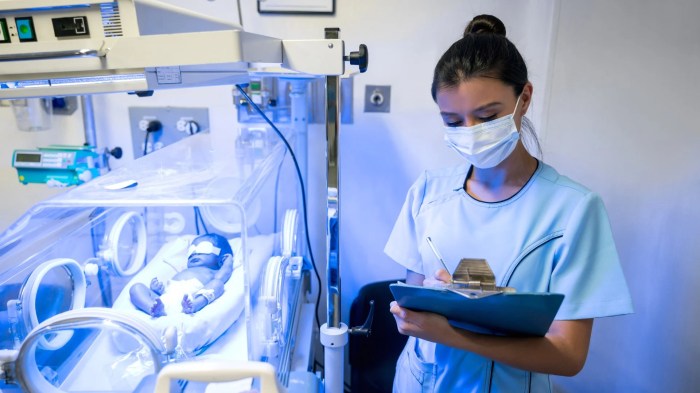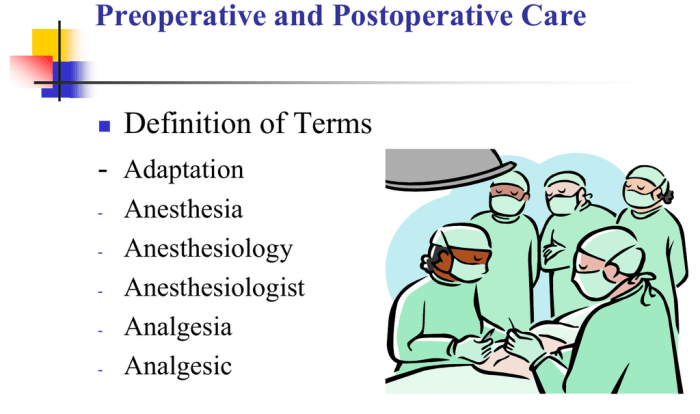Navigating the complexities of NICU interview questions for nurses requires a multifaceted approach, encompassing both technical proficiency and compassionate care. This guide delves into the intricacies of this specialized field, providing a comprehensive overview of essential nursing principles, assessment techniques, and ethical considerations.
As you embark on your journey to excel in NICU nursing, this guide will equip you with the knowledge and confidence to effectively care for these vulnerable patients and their families.
NICU Nursing Fundamentals: Nicu Interview Questions For Nurses
Neonatal intensive care nursing requires specialized knowledge and skills to provide optimal care for critically ill and premature infants. Essential nursing care principles in the NICU include:
- Maintaining a stable and supportive environment
- Providing individualized and developmentally supportive care
- Promoting family-centered care
- Adhering to strict infection control measures
- Utilizing evidence-based practices
Specific Monitoring Techniques
In the NICU, advanced monitoring techniques are crucial for assessing and managing the health of neonates. These include:
- Pulse oximetry: Measuring oxygen saturation levels
- Capnography: Monitoring carbon dioxide levels
- Apnea monitoring: Detecting pauses in breathing
- Electrocardiography (ECG): Monitoring heart rate and rhythm
- Transcutaneous bilirubin monitoring: Measuring bilirubin levels in the skin
Common Medical Conditions and Interventions
NICU nurses encounter various medical conditions and provide specialized interventions for neonates. Common conditions include:
- Prematurity and low birth weight
- Respiratory distress syndrome (RDS)
- Bronchopulmonary dysplasia (BPD)
- Necrotizing enterocolitis (NEC)
- Sepsis
Interventions may involve:
- Mechanical ventilation
- Surfactant therapy
- Antibiotic therapy
- Total parenteral nutrition (TPN)
- Phototherapy
Assessment and Evaluation

The nursing assessment process in the NICU is crucial for identifying potential health issues and developing appropriate interventions. It involves gathering comprehensive data about the neonate’s physical, physiological, and behavioral characteristics.
Assessment methods include:
- Physical examination: Inspection, palpation, auscultation, and percussion are used to assess vital signs, skin integrity, musculoskeletal development, and neurological status.
- Anthropometric measurements: Weight, length, and head circumference are measured to assess growth and development.
- Behavioral observations: Nurses observe the neonate’s activity level, sleep-wake patterns, feeding cues, and interactions with caregivers.
- Medical history: Information about the mother’s pregnancy, labor, and delivery, as well as the neonate’s medical history, is collected.
Evaluation
Assessment findings are evaluated to determine the neonate’s health status and identify potential risks. Nurses use standardized assessment tools and guidelines to ensure consistency and accuracy.
- Physiological parameters: Vital signs, oxygen saturation, and glucose levels are closely monitored to assess respiratory, cardiovascular, and metabolic status.
- Developmental milestones: Nurses observe the neonate’s progress in reaching developmental milestones, such as head control, grasping, and social interaction.
- Behavioral patterns: Nurses evaluate the neonate’s feeding, sleep, and activity patterns to identify any deviations from normal.
- Risk factors: Nurses assess for potential risk factors that may contribute to health problems, such as prematurity, low birth weight, or congenital anomalies.
Documentation
Assessment findings are meticulously documented in the neonate’s medical record. Documentation should be clear, concise, and accurate, using appropriate medical terminology.
- Timely documentation: Assessment findings are documented immediately after the assessment to ensure accuracy and prevent delays in intervention.
- Objective and subjective data: Both objective (e.g., vital signs) and subjective (e.g., observations) data are recorded.
- Identification of abnormalities: Any deviations from normal are clearly documented and brought to the attention of the healthcare team.
Effective assessment and evaluation in the NICU are essential for providing optimal care to neonates and promoting their well-being.
Nursing Interventions

Nursing interventions in the NICU are crucial for providing optimal care to neonates with various health conditions. These interventions encompass a range of strategies aimed at supporting the infant’s development and well-being.
Design a detailed care plan for a neonate with respiratory distress syndrome
Respiratory distress syndrome (RDS) is a common respiratory condition affecting premature infants, characterized by immature lungs and surfactant deficiency. A detailed care plan for a neonate with RDS includes:
Oxygen therapy
Providing supplemental oxygen to maintain adequate oxygenation.
Mechanical ventilation
Using a ventilator to assist with breathing in severe cases.
Surfactant replacement therapy
Administering surfactant to improve lung function.
Positioning and suctioning
Ensuring proper positioning and suctioning of secretions to optimize respiratory function.
Monitoring
Closely monitoring vital signs, oxygen saturation, and respiratory status.
Organize a step-by-step guide for providing nutritional support to a premature infant
Premature infants have unique nutritional needs due to their immature digestive systems. A step-by-step guide for providing nutritional support includes:
Enteral feeding
Providing breast milk or formula through a feeding tube directly into the stomach.
Parenteral nutrition
Providing nutrients intravenously if enteral feeding is not feasible.
Monitoring
Assessing tolerance to feedings, monitoring growth, and adjusting nutritional intake as needed.
Create a table outlining the different types of medications administered in the NICU and their indications
Medications are often used in the NICU to treat various conditions. The following table Artikels common types of medications and their indications:| Medication Type | Indications ||—|—|| Antibiotics | Bacterial infections || Anticonvulsants | Seizures || Diuretics | Fluid overload || Sedatives | Pain relief and sedation || Respiratory stimulants | Respiratory depression |
Communication and Collaboration
Effective communication and collaboration are vital in NICU nursing to ensure optimal care for neonates and their families. Nurses play a pivotal role in facilitating communication between parents and healthcare providers, fostering a collaborative approach to patient care, and advocating for the rights of neonates and their families.
Demonstrating Effective Communication with Parents
- Use clear and concise language, avoiding medical jargon and explaining complex concepts in a way that is easily understandable.
- Listen attentively to parents’ concerns, fears, and hopes, providing emotional support and reassurance.
- Emphasize the importance of parental involvement in decision-making and encourage them to ask questions and express their preferences.
- Provide regular updates on the neonate’s condition, explaining any changes or procedures in detail.
- Create a safe and comfortable environment where parents feel respected and valued as partners in their child’s care.
Collaboration with Other Healthcare Professionals
Collaboration with other healthcare professionals is crucial for providing comprehensive and coordinated care to neonates. Nurses work closely with:
- Physicians to implement medical orders, monitor patient status, and provide updates on the neonate’s progress.
- Respiratory therapists to administer respiratory support, manage ventilator settings, and provide education on respiratory care.
- Dieticians to assess nutritional needs, develop feeding plans, and monitor growth and development.
- Social workers to provide support to families, connect them with resources, and address any psychosocial issues.
Advocating for the Rights of Neonates and Families
Nurses have a professional and ethical responsibility to advocate for the rights of neonates and their families. This includes:
- Ensuring that neonates receive appropriate and timely medical care based on their individual needs.
- Respecting the cultural and religious beliefs of families and incorporating them into the care plan whenever possible.
- Protecting the privacy and confidentiality of patients and their families.
- Empowering families to make informed decisions about their child’s care and supporting their choices.
- Providing ongoing education and support to families to ensure they are well-equipped to care for their neonate after discharge.
Ethical Considerations
Neonatal intensive care units (NICUs) present unique ethical dilemmas for nurses due to the complex medical decisions involving vulnerable infants and their families. Understanding the ethical principles and frameworks guiding nursing practice in this setting is crucial for ethical decision-making.
Principles of Neonatal Ethics
- Beneficence:Promoting the well-being and interests of the infant, prioritizing their health and quality of life.
- Non-maleficence:Avoiding harm and minimizing potential risks or discomfort to the infant.
- Respect for Autonomy:Involving parents and guardians in decision-making, respecting their values and wishes while ensuring the infant’s best interests are upheld.
- Justice:Ensuring fair and equitable access to care, resources, and treatment options for all infants, regardless of their background or condition.
Ethical Dilemmas in the NICU
- End-of-Life Care:Deciding when and how to provide life-sustaining treatments, considering the infant’s prognosis, quality of life, and family’s wishes.
- Treatment Withdrawal:Determining when it is appropriate to withdraw or withhold life-sustaining treatments, balancing the infant’s well-being with the potential for suffering.
- Resource Allocation:Prioritizing access to limited resources, such as ventilators or ECMO, when multiple infants are in critical condition.
- Parental Decision-Making:Navigating situations where parents’ wishes conflict with medical recommendations, balancing respect for autonomy with the infant’s best interests.
Decision-Making Processes in the NICU
Ethical decision-making in the NICU involves a collaborative approach, including the healthcare team, parents, and an ethics committee when necessary. Nurses play a vital role in facilitating communication, providing information, and advocating for the infant’s well-being. Ethical principles, legal frameworks, and institutional policies guide the decision-making process, ensuring transparency and accountability.
Professional Development

Continuing education and professional development are essential for NICU nurses to stay up-to-date on the latest advancements in neonatal care and maintain their competence in providing high-quality care to their patients. Continuous learning enables nurses to enhance their knowledge, skills, and abilities, which ultimately benefits the infants and families they serve.
Continuing Education, Nicu interview questions for nurses
- Formal Education:Pursuing higher education, such as a Master’s or Doctorate in Nursing, can provide nurses with advanced knowledge and skills in specialized areas of NICU care.
- Certifications:Obtaining certifications, such as the Neonatal Resuscitation Program (NRP) or the Neonatal Intensive Care Unit (NICU) certification, demonstrates a nurse’s expertise and commitment to providing high-quality neonatal care.
- Workshops and Conferences:Attending workshops and conferences allows nurses to stay abreast of the latest research and best practices in NICU care, network with other professionals, and engage in hands-on training.
Professional Organizations
Professional organizations, such as the National Association of Neonatal Nurses (NANN), provide a valuable platform for NICU nurses to connect with colleagues, access educational resources, and advocate for the profession. These organizations offer continuing education opportunities, mentorship programs, and networking events that support nurses’ professional growth and development.
Expert Answers
What are the most common NICU interview questions?
Common NICU interview questions include inquiries about your experience with neonatal care, specific nursing interventions, ethical considerations, and communication strategies.
How can I prepare for NICU interview questions?
Thoroughly research NICU nursing practices, familiarize yourself with common medical conditions and interventions, and practice answering potential interview questions.
What are the key qualities of a successful NICU nurse?
Successful NICU nurses possess a combination of technical skills, compassionate care, strong communication abilities, and a commitment to professional development.
